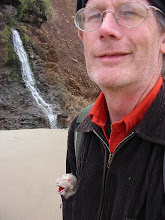On October 5th, the day before Occupy Portland began, I witnessed a miscarriage of justice. As I came onto the inbound platform at the Sunset Transit Center around 5:10 p.m., a woman's raised voice got my attention. She could be heard clearly along the entire platform. Every passenger was looking her way. She was standing near the middle on my side, holding onto a bike and dressed in riding gear. She was talking to a Tri-Met cop. At the far end of the platform, where the front end of the trains stop, the cop was trying to ignore her. He had his ticket pad and pen out and was talking with a young man.
The woman accused the cop of harrassing the youth, saying he was “misusing his position of authority.”
Though loud and with an edge of anger, her voice was even and her thoughts rational. The cop shouted back, “Sir---”
“I'm not a sir.”
“Ma'am. This is none of your business. You don't even know what we've been talking about.”
“I've heard everything you've said,” she replied. “Your conversation has been loud enough for everyone to hear.”
“I'm doing my job. I'm investigating a violation. You have no say about this.”
“I certainly do if I witness an abuse being committed.”
“I'm doing my job. You're interefering.”
“I can speak. I have a right of free speech and I'm exercising it.”
“You don't have free speech to interfere with my job.”
“I'm not interfering. I'm nowhere near you. I'm just speaking.”
This went on for about 30 seconds before the cop ran out of patience. He left the young man to half-stalk, half-run over to the woman. He was about six foot eight. She was portly, middle-aged, and showed no sign of being intimidated.
I noticed my train pull in and decided to stay for the next one.
“If you don't keep quiet I'm going to cite you for interfering with police business.”
“I guarantee if you cite me you're going to end up in court.”
“You could get 30 days.”
The cop saw that the young man had fled up the stairs. He trotted after him.
I took a seat a respectful distance from the woman, got out my phone and fired up the camera.
The cop came back, agitated. He walked up to the woman, rolled back another page of his citation book, and said, “I'm citing you for interfering with police business. May I see your identification, please?”
As she got her card out of a saddlebag, I held up my phone to get a picture. The cop spotted it right away and bolted over to me.
“I have to tell you that it's against the law to take a video of anyone in public without the knowledge of everyone who's being filmed.”
“I consent,” the woman shouted.
I said, “It's not a video, it's a still camera. Are you saying I can't take photos of you, as a public officer, doing your public duty?”
“I'm not saying that. I'm saying that you can't take a video or sound recording without the knowledge of everyone in the area who might be filmed.”
“It's not a video.” I was holding up the camera so he could check it out but he was already on his way back to write the ticket.
There was a woman who had been sitting quietly nearby throughout the scene. I asked her if she'd seen what happened. She said yes, but hadn't tuned into what was going on between the cop and the young man.
The woman who had riled the cop was quiet as he wrote the ticket. The next train came and I felt the call to get home to my family, dinner, the evening schedule. At the same time, as a witness I should stay and let the woman know I could back her up, if necessary.
Force of habit got the best of me and I boarded the train. As soon as the doors closed I got witness regret: that's when you don't take a stand even though you were right there watching. So if by a remote chance the cited bicyclist is reads this, please get in touch with me: nickareeno@gmail.com.
THE END
Nick O'Connor
Copyright 2011

No comments:
Post a Comment